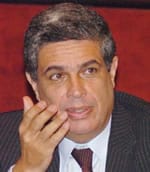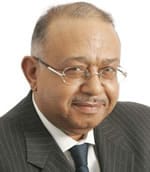Regional Report / Gcc
Competition for talent in the banking industry is driving up costs as demand for financial services expands.
 |
|
El-Labban: Talent is more likely to join or stay on at a growing bank |
As more global banks enter the fast-growing Gulf region and set up offices in its gleaming new financial centers, they are competing for a limited pool of trained professionals. Existing banks as well as newcomers are being forced to offer higher salaries and more-attractive compensation packages to attract and retain the best employees.
“It is not only the global banks or the newly created banks that are competing for staff,” explains Ghazi Abdul-Jawad, president and chief executive of Bahrain-based Arab Banking Corporation (ABC). “There is a severe war for talent, a very vicious war for talent, across the industry, and this will not abate.”
The growing demand for financial services in the region means that top bankers are spending more and more of their time on human-resources issues. “In Bahrain in the next three years, the industry will need to double its workforce at the rate of growth in demand for services we are seeing,” Abdul-Jawad says from his office in ABC Tower in downtown Manama overlooking the Gulf. “This is driving cost/income ratios higher. We are introducing compensation packages on a par with what is being offered in London and New York,” he notes. ABC has introduced variable-incentive schemes based on performance, as well as golden handshakes and golden parachutes, as part of its long-term retention strategy, he says. Meanwhile, the salaries of Bahraini nationals are being equalized with those of expatriates.
Adel El-Labban, group chief executive and managing director of Bahrain-based Ahli United Bank (AUB), says he spends at least 20% of his time on human-resources issues, including attracting, training and motivating employees. “Talent is more likely to join or stay on at a growing bank,” he explains. “We are a growth-oriented bank, and we tend to recruit junior and middle-management staff.”
AUB has launched a large employee stock-ownership plan to encourage staff to work hard to increase the value of the company and to develop a sense of ownership, El-Labban says. “We are a meritocracy, and we recruit the best people and treat them fairly,” he says. Earlier this year AUB won the Shaikha Sabeeka Award for Bahraini Women’s Empowerment. More than 35% of the bank’s staff is female.
“People who join our bank in Bahrain often advance to the point where they manage operations in other countries, such as Egypt or the UK,” El-Labban says. “With our network, we have the ability to move people around, which helps to create a career path for them.”
AUB’s goal is to create a branch network in all eight countries bordering the Gulf, as well as in Egypt, Lebanon and Yemen, and to add a second European hub in Switzerland to complement its operations in the United Kingdom. “We will expand our network through friendly acquisitions as the right opportunities arise,” El-Labban says. “We would like to have a presence in all 13 of these countries.”
In August 2006 a group of investors led by AUB acquired an 89.3% stake in Egypt-based Delta International Bank. In May the Egyptian bank was officially renamed Ahli United Bank-Egypt. AUB also has a joint venture, known as Future Bank, with Iran’s Bank Melli Iran and Bank Saderat Iran, with branches in Bahrain. Future Bank opened a branch in June in the Iranian special economic zone on the island of Kish. In December 2005 AUB acquired a 49% interest in Commercial Bank of Iraq, which has continued to operate on a profitable basis despite the security risks.
Back in Bahrain, Prime Minister Shaikh Khalifa ibn Salman Al-Khalifa formally opened Phase I of the $1.5 billion Bahrain Financial Harbour project in May. The 53-story Harbour Towers will provide office and commercial space for Bahrain’s expanding financial services industry. With some 390 licensed banks and financial institutions, including 120 Islamic investment funds, Bahrain is a leading financial center of the Middle East.
Meanwhile, neighboring Saudi Arabia’s banking sector has been progressively liberalized since the late 1990s, when foreign-owned branches of Gulf Cooperation Council (GCC) banks were allowed to enter the market. In 2003 the Saudi Arabian Monetary Agency (SAMA) granted Deutsche Bank the first foreign banking license to a non-GCC bank in 20 years. BNP Paribas and JPMorgan Chase received licenses in 2004.
The Capital Markets Law, enacted in July 2003, liberalized the market for investment banking, brokerage and related services. As of June 2007 some 55 foreign and local companies had been licensed to provide investment banking and brokerage services. HSBC received an investment banking license separate from its participation as a joint-venture partner in the Saudi British Bank (SABB), based in Riyadh. Foreign banks are permitted to enter joint ventures with local banks and to open direct branches in the kingdom.
“We are competing for human resources,” says John Coverdale, managing director of SABB. “All of the regional banks are fishing in the same pool.” SABB, which operates through a network of 73 branches, has more than 2,700 employees.
 |
|
Abdul-Jawad: There is a severe war for talent across the industry |
Saudi licensing of additional foreign banks has been put on hold to enable SAMA to assess the impact that the new entrants already approved are having on the industry. While domestic banks have large established branch networks that will give them an edge in retail banking, the foreign banks are likely to focus on such areas as investment banking, project finance and asset management.
The opening of the Saudi banking market to foreign competition is happening at a time when the domestic economy is enjoying strong growth and the capital markets are becoming deeper and more developed, economists say. This will lessen the impact from the entrace of new participants, many of which were already competing with the local banks by offering services to Saudi Arabian customers from offshore centers in neighboring countries such as Bahrain.
Foreign banks will offer niche competition in certain areas but will not be able to compete for the core consumer and corporate banking business of the Saudi Arabian commercial banks, says Robert Eid, managing director and CEO of Arab National Bank (ANB). “We have superior knowledge of the local market and established relationships,” he says.
“ANB’s strategy for growth is known as the egg strategy,” Eid says. “We will continue to be a universal bank focused on our core business, but we will add four or five offshoots, or affiliates.” Each of these arms will be formed in association with a company that is the leader in these specific areas, he says. “We will form a housing finance company in cooperation with the biggest residential developer in the Middle East,” he continues. “We will start a heavy-equipment leasing company with the largest construction company in the region. We will also form a banc assurance company and an investment company. Each will be the best in breed,” he says.
ANB was the only Saudi Arabian bank to report positive earnings growth for the first quarter of 2007. This was largely because of the bank’s extremely conservative approach to business. “While other banks were lending to the stock market boom in 2006, we were concentrating on our core activities, including retail banking, which accounts for 60% of our earnings,” Eid says.
Gordon Platt



